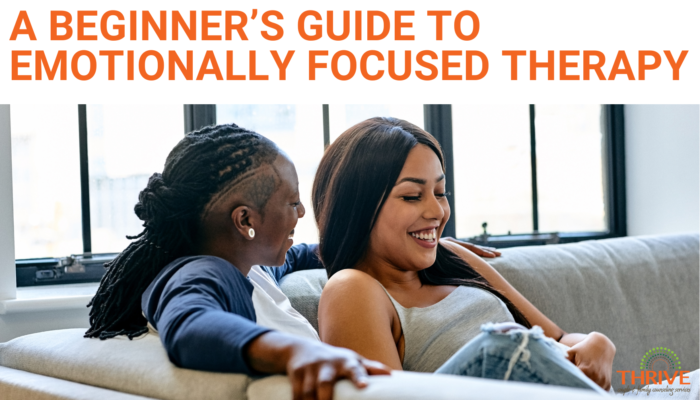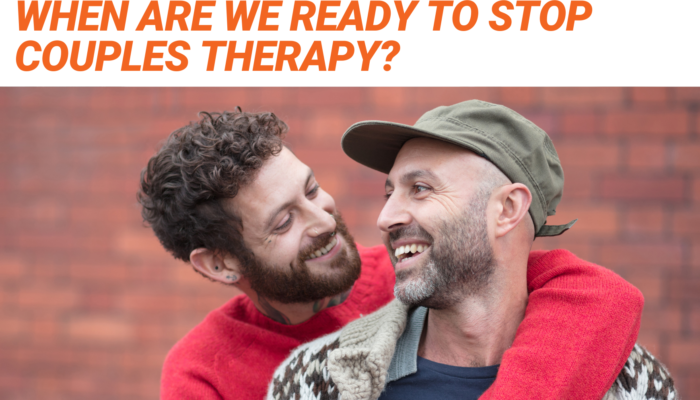“Being the ‘best you can be’ is really only possible when you are deeply connected to another.”
― Dr. Sue Johnson
On average, couples spend six years being unhappy before they reach out for counseling. A couple recently expressed, “We’ve been treading water, doing it on our own for the past few years, but we have run out of resources. We need some help!” Struggling in your relationship not only causes pain for each of you but can negatively impact your social, familial, and physical well-being. Arguing regularly with the person you love exacerbates feelings of anxiety and depression. Disconnection with your partner can heighten social concerns, cause problems at work, and too many times, result in divorce and break-ups. Here at Thrive, we believe in a way to help heal relationship distress that is effective, compelling, and long-lasting. That way for us is Emotionally Focused Therapy.
Why Emotionally Focused Therapy (EFT)?
So, why do we practice Emotionally Focused Therapy? For starters, couples who have gone through Emotionally Focused couples counseling experience more relationship satisfaction and intimacy. They tend to argue less about specific issues. EFT has been effectively used with diverse populations with anything from mild to severe couples’ issues. The work includes intense topics like health problems, depression, and trauma. Couples also successfully progress towards forgiveness, satisfaction, and trust when working through infidelity together.
Theories Behind Emotionally Focused Therapy
Emotionally Focused Therapy (not to be confused with Emotion Focused Therapy, also EFT) has the following theoretical underpinnings:
- EFT comes from a Humanistic Experiential perspective. In other words, we won’t pathologize your experience or try to “find the bad guy” in your relationship. Instead, we will approach you and your relationship with empathy and look for the sound reasoning and meaningful emotion behind your behavior.
- EFT uses Systems Theory to understand how each partner’s actions cause a reaction in the other person creating a self-perpetuated “dance” or cycle.
- Emotionally Focused Therapy also draws on Gottman’s work on healthy vs. unhealthy relationships. We’ll find ways to decrease the known predictive factors of divorce through sharing together, including criticism, defensiveness, stonewalling/ignoring, and contempt.
- Finally, Attachment Theory lies at the very heart of EFT. In her book, Love Sense, Sue Johnson (2008) explains emotional attachment like this:
-
- “We…try to maintain an emotional and physical connection with our loved ones. Throughout life, we rely on them to be emotionally accessible, responsive, and engaged with us.”
- “We reach out for our loved ones, particularly when we are uncertain, threatened, anxious, or upset. Contact with them gives us a sense of having a safe haven, where we will find comfort and emotional support.”
- “We miss our loved ones and become extremely upset when they are physically or emotionally remote.”
Reaching Sometimes Sounds Like Screeching!
Reaches to one another play out in predictable patterns, and when in we’re distress they are not always pretty. Connecting with others is the central motivator for survival and growth, so when we don’t get the connection we desire, we tend to “act out.” We’ve had clients who explain to their partners, “I yell because it’s the only tool I can use that actually gets through to you,” to which partners may respond, “When you yell, I feel like I’ll do anything to make it stop,” or “I just want to run out of the room!”
These negative patterns can include criticizing/attacking one partner and defending oneself/distancing from the other. The cycle creates a rigid, inflexible dynamic packed with:
- Protest and anger
- Seeking and clinging
- And even depression and despair
Does this sound familiar? One partner reaches out through fighting or yelling. He or she wants to reconnect so intensely that they resort to anger to get this point across. The other partner may hear that frustration and say, “I’m getting out of here; this is too intense,” and withdraws or withholds to maintain protection. Hence, the “dance” begins in an unending cycle that can take over the relationship. Underneath, all either partner wants is to be connected in safety and love.
How Does EFT Work?
Emotionally Focused Therapy can reduce your conflict by encouraging emotional connection with your partner during experiential therapy sessions. Basically, you both talk to the therapist and with one another in a safe and structured environment. We believe that the best way to regulate or bring difficult emotions back to balance is to share them with the ones we love.
You’ll spend the majority of early sessions with your partner and your therapist de-escalating conflict. We don’t suggest simply “playing nice,” but listening for and sharing the underlying emotions that are driving your disagreements. So instead of saying, “I lie because you freak out when I tell you the truth,” we find the deeper reasons. A withdrawing partner may find that he or she withholds to preserve the relationship. For example, “I lie because I so badly want to protect us from the terrible fights we get into. I feel like I could risk losing you if I told you the truth.”
This cycle is motivated by underlying attachment issues and how close you feel to one another.
Topics like sex, finances, kids, and stress may fly left and right and seem to be the culprits of relationship distress. However, the aspect that drives every argument you have is how much faith you have that when you reach for your person, they will be there for you.
Your therapist will help each of you get to the bottom of “underneath the iceberg” emotions that fuel arguments at their core. Hopefully, this de-escalation process will bring the relief that you need to begin feeling connected once again.
Finding Sweet Relief through EFT
As a result of going to Emotionally Focused Therapy sessions, you will learn to:
- Identify and understand your relationship’s negative cycle or “dance.”
- Acknowledge, talk about, and accept the feelings you both hold under the surface.
- Understand the role you each play in the cycle.
- Be able to spot each of your triggers that set the whole thing off.
- View the cycle as the problem, not one another.
When this relief starts to sink in, you will see a significant change. Rather than blaming each other, the cycle itself will be seen as the problem. When you fight the cycle as your common enemy (you can create your own nickname name for it), you once again are freed up to become a team. You’ll be able to tune into emotions so that you know what you each need from one another. You’ll find out how to express those desires openly in a way that evokes sympathy and support. The refreshing part here is no one has to be “the bad guy,” and you can both be in it together.
You can view one another as your safe haven once again.
Case(s) in Point
Sound too good to be true? It isn’t!
Couples typically come to Thrive feeling disconnected or lacking trust. Many times, couples feel they have lost the “old them” who laughed, talked, played, and were intimate with one another. Couples believe all they can do is stay silent in fear of the next big blow-up, and stuck “walking on eggshells.”
Even after a few sessions, the most amazing experience can start to occur. Couples can begin turning toward one another and sharing from a place of emotion and longing rather than criticism, to-do lists, anxieties, confusion, or fear.
For instance, one partner may say, “I didn’t know you were scared you would lose me, and that’s why you felt you needed to control so tightly.” Or, “I didn’t know that underneath your withdrawing, you were sad. I’m right here, and I don’t judge you for your sadness.” It’s amazing what happens when couples start to let each other in, underneath their protective armor. The process is both life-giving and life-changing!
How to Get Started With Emotionally Focused Therapy
If you are in a difficult stage in your relationship, we are here for you with tangible steps to get back to connecting with the person you love the most.
Here at Thrive, the process is pretty simple. You will first meet with your therapist for a 75-minute couple session. Then, you will meet individually with your counselor so he/she can learn about you, your background, and hear your perspective. Finally, you’ll come back together and continue the couples therapy process.
To get more information on working with us, contact us at 303-513-8975, X1 or contact us here. We believe in Emotionally Focused Therapy and trust it can help make the difference you have been longing for in your relationship.
Read More about Emotionally Focused Therapy
Here are some more resources to read up on about Emotionally Focused Therapy by our therapists:
References
-
Beasley, Candice C. & Ager, Richard (2019). Emotionally Focused Couples Therapy: A Systematic Review of Its Effectiveness over the past 19 Years, Journal of Evidence-Based Social Work, 16:2, 144-159, DOI: 10.1080/23761407.2018.1563013.
-
Gaspard, Terry (2015). Timing is everything when it comes to marriage counseling. Retrieved from The Gottman Institute.
-
Gottman, John M. (2000). The Seven Principles for Making Marriage Work: A Practical Guide from the Country’s Foremost Relationship Expert. New York: Three Rivers Press.
-
Johnson, Sue (2008). Hold Me Tight: Seven Conversations for a Lifetime of Love. New York: Little, Brown, and Company.
-
Weibe, Stephanie & Johnson, Susan M. (2016). A review of the research in Emotionally Focused Therapy for couples. Family Process. (55) 390-407.




